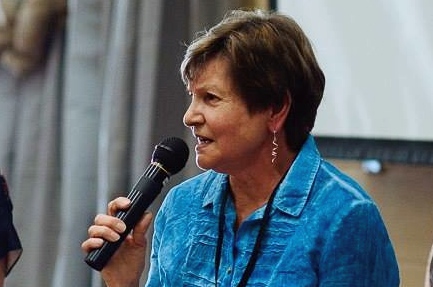The weekly TGCvocations column asks practitioners about their jobs and how they integrate their faith and work. Interviews are condensed.
Betty McPhee is a teacher at Northern Secondary School in Toronto, Ontario. Born to Deaf parents, she has worked in education with the Deaf community for many years. She and her husband, Howard, a retired pastor, have been married for 46 years and have 3 children and 1 granddaughter. Betty serves as vice president of the Waldenstrom’s Macroglobulinemia Foundation of Canada.
 How do you describe your work every day?
How do you describe your work every day?
I teach English courses in the Deaf department at one of Toronto’s public high schools. I teach these courses in American Sign Language (ASL), which is most students’ first language. Some of my students, however, didn’t learn ASL at home, making it challenging for them to learn English. Others immigrated to Canada and learned a different sign language. These students must learn ASL before English.
As an image-bearer of God, how does your work reflect some aspect of God’s work?
With God’s help, I’m supporting Deaf students to flourish. Having been raised by Deaf parents, I know well that Deaf people are capable of everything but hearing. They don’t need to be fixed so much they need to be given the tools for flourishing. At a fundamental level, this flourishing means access to sign language. Often, I must advocate for this with students’ parents, who either don’t understand the importance of sign language as means of native/natural communication or who don’t support their child’s use of it. Some prefer trying technological solutions to “fix” their children’s hearing, like cochlear implants, but those attempts aren’t usually as effective as parents hope. Deaf students—like all other students—need language for their cognitive development. They also need educational accommodations to ensure their success. I advocate for these things—with parents, other teachers, and school officials.
How does your work give you a unique vantage point into the brokenness of the world?
Unfortunately, I see how the Deaf community suffers “audist”—that is, discriminatory—attitudes of the world around them. In education, decisions are still being made for Deaf students by hearing professionals. The bias and ignorance can prevent these students from reaching their full potential. The tragic reality is also that Deaf people suffer exclusion and isolation on a daily basis, even from their own family members who don’t take the time or refuse to make the effort to communicate with them. As a result, we see many Deaf students with psychological and mental issues. I grieve this brokenness but believe that God has granted me a unique ability to understand and fight these injustices.
By God’s grace, I often see small signs of hope. One student who’d graduated recently returned to talk to my current students. She talked about the pain of never being fully accepted for who she is. Her parents have always wanted her to function as a hearing person. Despite these obstacles, this young woman is attending college, planning to become an artist, and even hoping to return someday to Bangladesh, her country of origin, to advocate for accessible education for Deaf students. Students like her make my job worthwhile.
Involved in Women’s Ministry? Add This to Your Discipleship Tool Kit.
 We need one another. Yet we don’t always know how to develop deep relationships to help us grow in the Christian life. Younger believers benefit from the guidance and wisdom of more mature saints as their faith deepens. But too often, potential mentors lack clarity and training on how to engage in discipling those they can influence.
We need one another. Yet we don’t always know how to develop deep relationships to help us grow in the Christian life. Younger believers benefit from the guidance and wisdom of more mature saints as their faith deepens. But too often, potential mentors lack clarity and training on how to engage in discipling those they can influence.
Whether you’re longing to find a spiritual mentor or hoping to serve as a guide for someone else, we have a FREE resource to encourage and equip you. In Growing Together: Taking Mentoring Beyond Small Talk and Prayer Requests, Melissa Kruger, TGC’s vice president of discipleship programming, offers encouraging lessons to guide conversations that promote spiritual growth in both the mentee and mentor.

































